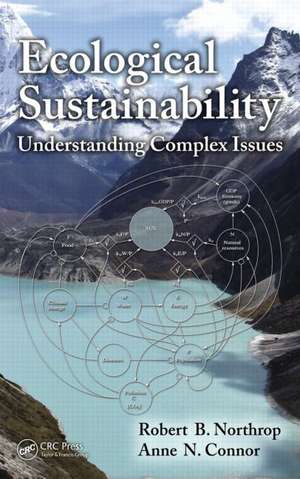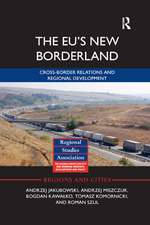Ecological Sustainability: Understanding Complex Issues
Autor Robert B. Northrop, Anne N. Connoren Limba Engleză Hardback – 20 mai 2013
| Toate formatele și edițiile | Preț | Express |
|---|---|---|
| Paperback (1) | 427.84 lei 6-8 săpt. | |
| CRC Press – 12 oct 2017 | 427.84 lei 6-8 săpt. | |
| Hardback (1) | 1106.75 lei 6-8 săpt. | |
| CRC Press – 20 mai 2013 | 1106.75 lei 6-8 săpt. |
Preț: 1106.75 lei
Preț vechi: 1484.63 lei
-25% Nou
Puncte Express: 1660
Preț estimativ în valută:
211.84€ • 230.19$ • 178.06£
211.84€ • 230.19$ • 178.06£
Carte tipărită la comandă
Livrare economică 21 aprilie-05 mai
Preluare comenzi: 021 569.72.76
Specificații
ISBN-13: 9781466565128
ISBN-10: 1466565128
Pagini: 548
Ilustrații: 98 b/w images, 14 color images and 27 tables
Dimensiuni: 156 x 234 x 36 mm
Greutate: 0.93 kg
Ediția:New.
Editura: CRC Press
Colecția CRC Press
ISBN-10: 1466565128
Pagini: 548
Ilustrații: 98 b/w images, 14 color images and 27 tables
Dimensiuni: 156 x 234 x 36 mm
Greutate: 0.93 kg
Ediția:New.
Editura: CRC Press
Colecția CRC Press
Public țintă
Practitioners and upper-level undergraduate and graduate students in sustainability science and policy, environmental engineering, environmental management, renewable energy, and natural resource management; practitioners in applied climatology; interested readers with a college education in the sciences; juniors and senior undergraduates and graduate students majoring in the sciences and engineering; and industry professionals, researchers, academics, economists, ecologists, and agricultural, mining and civil engineers.Cuprins
Human Sustainability. Review of Complexity and Complex Systems. Multidimensional Challenges to Human Sustainability. Mitigations of Human Impacts Through Technology. Sustainable Agriculture. Unconventional Foods: Insects, Plankton, Fungi and In Vitro Meat. Complex Economic Systems and Sustainability. Application of Complex Systems Thinking to Sustainability Problems. What Will Happen to Us?: FAQs on Sustainability.
Notă biografică
Robert B. Northrop, majored in electrical engineering (EE) at the Massachusetts Institute of Technology (MIT), graduating with a bachelor’s degree. At the University of Connecticut (UCONN), he received a master’s degree in systems engineering. He entered a PhD program at UCONN in physiology, and received his PhD in 1964. Dr. Northrop’s research interests have been broad, interdisciplinary, and centered on biomedical engineering and physiology. His current interest lies in complex systems. Dr. Northrop was on the electrical and computer engineering faculty at UCONN until his retirement in June 1997. As emeritus professor, he still teaches graduate courses in biomedical engineering.
Anne N. Connor, MA, is currently working as the director of community grants for Methodist Healthcare Ministries, a medical nonprofit organization in San Antonio, TX. Her educational background includes a bachelor’s degree from Dartmouth College, where she received honor citations in chemistry and sociology. Her master’s degree in communications is from the University of New Mexico at Albuquerque. She is the coauthor of Introduction to Molecular Biology, Genomics and Proteomics for Biomedical Engineers (Taylor & Francis/CRC Press, ISBN # 1420061194). She has received numerous awards for her work, most recently a humanitarian award from the San Antonio health care community.
Anne N. Connor, MA, is currently working as the director of community grants for Methodist Healthcare Ministries, a medical nonprofit organization in San Antonio, TX. Her educational background includes a bachelor’s degree from Dartmouth College, where she received honor citations in chemistry and sociology. Her master’s degree in communications is from the University of New Mexico at Albuquerque. She is the coauthor of Introduction to Molecular Biology, Genomics and Proteomics for Biomedical Engineers (Taylor & Francis/CRC Press, ISBN # 1420061194). She has received numerous awards for her work, most recently a humanitarian award from the San Antonio health care community.
Recenzii
"In this time of narrow specialization, the authors have provided a remarkably broad synthesis of the biophysical factors that support human sustainability."
––Joseph A. Tainter, Department of Environment and Society, Utah State University
––Joseph A. Tainter, Department of Environment and Society, Utah State University
Descriere
Complex systems is a new field of science studying how parts of a system give rise to the collective behaviors of the system, and how the system interacts with its environment. This book examines the complex systems involved in environmental sustainability, and examines the technologies involved to help mitigate human impacts, such as renewable energy, desalination, carbon capture, recycling, etc. It considers the relationships and balance between environmental engineering and science, economics, and human activity, with regard to sustainability.
























